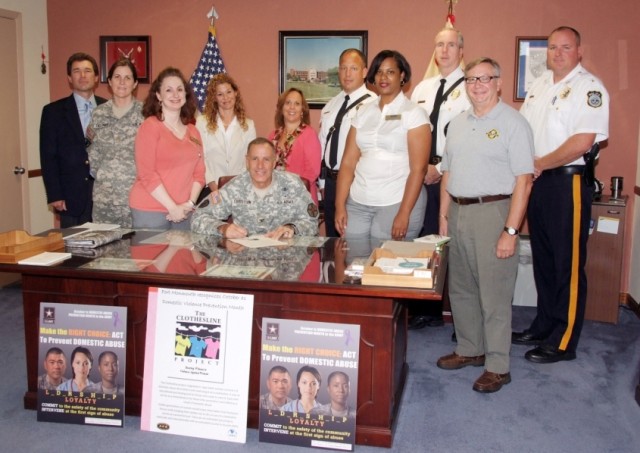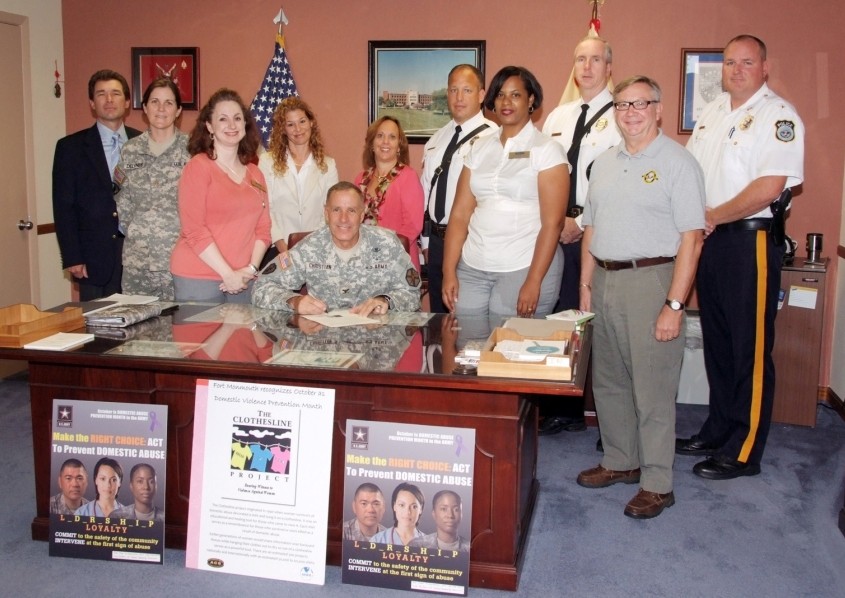
FORT MONMOUTH, N.J. -- Domestic abuse is a cunning enemy of family life, often evolving in a subtle or stealthy manner before escalating in severity.
Abuse often starts with threats, name calling and damage to objects. It can quickly advance to punching, throwing, grabbing, slapping and eventually become life threatening.
According to the National Coalition Against Domestic Violence:
-- One in every four women will experience domestic violence in her lifetime
-- The direct cost of medical and mental health services for those victimized by intimate partner violence is $4.1 billion a year.
-- Boys who witness domestic violence are twice as likely to abuse their own partners and children when they are adults.
In support of the drive to prevent domestic abuse, Col. Stephen M. Christian, Fort Monmouth Garrison commander, last week signed a proclamation recognizing that domestic abuse has become a public health and criminal justice epidemic in our society.
"We are so often called upon to facilitate safety and peace throughout the world; however, we must be motivated to maintain peace and tranquility in our own homes so we are ready to serve our country whenever we are called," states one section of the proclamation.
Along with many other organizations, Fort Monmouth's Army Community Services is recognizing October as Domestic Violence Prevention Month using the theme, "Domestic Abuse Prevention: Make the Right Choice."
The Army's policy has always been that there is no excuse for domestic violence, an offense under the Uniform Code of Military Justice.
Gen. George W. Casey, Army chief of staff, has said that the Army needs to provide the level of support for Soldiers and families that is commensurate with the contributions and sacrifices they are making.
A pattern of domestic abuse can become so ingrained in a relationship that victims can have difficulty recognizing what is happening to them.
"There can be a lot of rationalizing and excusing of behavior that's really about power and control," said Susan Mullen, Family Advocacy Program Manager, Army Community Services, at Fort Monmouth.
"They might say, 'He lost his job or is having a bad day,' believing that if the person didn't have that bad break or unfortunate incident that he would have acted a different way," Mullen said.
In addition, Mullen added, some victims may blame themselves with an explanation such as, "I picked him. What does that say about me'"
A victim can also get caught up in a cross-current of emotions.
"So often victims of domestic violence feel an overwhelming sense of fear, embarrassment and shame that this is in fact happening to them," Mullen said. "They often make excuses, cover up and stay in relationships not knowing how to get out of them or how people will judge them."
At Fort Monmouth, one of Mullen's duties is to pair up victims of domestic violence with victim advocates, who provide such support as escorting victims to court, as well as explaining their options and all the services available to them.
According to Army Central Registry data, most domestic abuse cases in the Army involve young Soldiers and spouses. In 2008, the latest year for which data is available, 62 percent of offenders were pay grade E-4 or below, and 91 percent were E-6 or below.
Nearly 80 percent of cases involved married partners between the ages of 18-31 years.
The good news is that cases of domestic abuse have dropped by 35 percent since 2001, and the rate per 1,000 fell more than 40 percent in the same period. One possible explanation is the long separations many Army families have faced due to deployments and a high operations tempo, according to Army officials.
The extent of domestic violence in society as a whole is difficult to gauge. According to the National Coalition Against domestic Violence, only about 25 percent of domestic violence cases are reported. The coalition estimates that 1.3 million women are victims of physical assault by an intimate partner each year.
A valuable local resource for assistance in all aspects of domestic violence is 180 Turning Lives Around, Inc., a non-profit organization serving all of Monmouth County. It provides services for persons affected by domestic and sexual violence, rape and child abuse.
The 180 Web site, www.180nj.org, has a section on domestic violence that includes common questions and a checklist form titled, "Is My Relationship Abusive'"
The site section on domestic violence also has a page with an extended definition of domestic abuse that goes beyond physical assault to include psychological, sexual and financial examples of abusive behaviors.
"Violence may not be apparent at the start of a relationship but abuse may start out in very subtle, controlling ways that are not always clear," said Sue Levine, coordinator of the Victim Support Program at the 180 organization.
Levine said an abuser may try to isolate a victim from friends or family, or try to gain complete control of finances by saying something like, "You're not all that good at math; let me control the money."
Despite an abusive relationship, some women stay in it for a variety of reasons, Levine said. "They may still love the offender, but the number one reason is they are scared.
If they are married, she may believe divorce is not something you do. Financial reasons also make it very difficult to leave. Especially in Monmouth County, rents are very high. They may also be concerned about school and lifestyle changes for the children," she said.
If a woman does decide to leave a relationship, it's important to do some planning, Levine said. "The most dangerous time is when a victim is leaving the relationship, she said. "When they leave, they need to have a safety plan."
Within the Army, one of the goals of Domestic Violence Awareness Month is to place the problem of domestic violence in a larger context. One of the sections of the proclamation states:
"When domestic violence occurs amongst our Soldiers and their Families, and our Workforce, it undermines our community and our mission."

Social Sharing